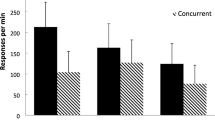Abstract
The experiment was based on the hypothesis that changeover behavior is maintained by the relatively immediate consequences of the changeover response. Time allocation and relative response rates were measured in a situation where the changeover response resulted in a fixed duration stay in one of two random-interval schedules. Under these conditions, time distributions tended to match relative rates of reinforcement only if the duration of this imposed stay was approximately equal to the in-terchangeover time that was emitted when the opportunity to change over was always available. Interchangeover times were insensitive to the duration of the imposed stay in a schedule. Relative response rates did not always match relative rates of reinforcement, nor did they always conform to time allocation. The results are discussed in terms of local control of responding.
Similar content being viewed by others
References
CATANIA, A.C. 1966. Concurrent operants. In W.K. Honig (Ed.), Operant behavior: Areas of research and application. New York: Appleton-Century-Crofts.
DE VILLIERS, P. 1977. Choice in concurrent schedules and a quantitative formulation of the law of effect. In W.K. Honig & J.E.R. Staddon (Eds.), Handbook of operant behavior. New York: Prentice-Hall.
HERRNSTEIN, R.J. 1961. Relative and absolute strength of response as a function of frequency of reinforcement. Journal of the Experimental Analysis of Behavior, 4, 107–116.
KELLER, K. 1974. The role of elicited responding in behavioral contrast. Journal of Experimental Analysis of Behavior, 21, 249–257.
KILLEEN, P. 1972. A yoked-chamber comparison of concurrent and multiple schedules. Journal of the Experimental Analysis of Behavior, 18, 13–22.
MOORE, J. 1979. Choice and number of reinforcers. Journal of the Experimental Analysis of Behavioral, 51–63.
NEWBY, W., MEMMOTT, J., & KENDALL, S.B. 1978. Effects of a limited hold on changeovers maintained by concurrent interval schedules of reinforcement. The Psychological Record, 28, 445–453.
PLISKOFF, S.S. 1971. Effects of symmetrical and asymmetrical changeover delays on concurrent performances. Journal of the Experimental Analysis of Behavior, 16, 249–256.
RACHLIN, H. 1973. Contrast and matching. Psychological Review, 80, 217–234.
SHIMP, C.P., & WHEATLEY, K.L. 1971. Matching to relative reinforcement frequency in multiple schedules with a short component duration. Journal of the Experimental Analysis of Behavior, 15, 205–210.
SHULL, R.L., & PLISKOFF, S.S. 1967. Changeover delay and concurrent schedules: Some effects on relative performances measures. Journal of the Experimental Analysis of Behavior, 10, 517–527.
STUBBS, D.A., PLISKOFF, S.S., & REID, H.M. 1977. Concurrent schedules: A quantitative relation between changeover behavior and its consequences. Journal of the Experimental Analysis of Behavior, 27, 85–96.
Author information
Authors and Affiliations
Additional information
I am very grateful to Stephen Kendall, without whose continuing support this research would not have been possible. Nancy Innis, Barbara Mann, William Mills, and Greg Moran have all made helpful comments on the manuscript. This research was supported partly by a grant from the National Research Council of Canada to S.B. Kendall and partly by a Social Science Research Grant from the University of Western Ontario to the author. Preparation of this paper was supported by a grant from the Natural Science and Engineering Research Council to the author.
Rights and permissions
About this article
Cite this article
Newby, W. Choice in Concurrent Schedules with a Fixed-Duration Alternative. Psychol Rec 30, 61–71 (1980). https://doi.org/10.1007/BF03394655
Published:
Issue Date:
DOI: https://doi.org/10.1007/BF03394655




